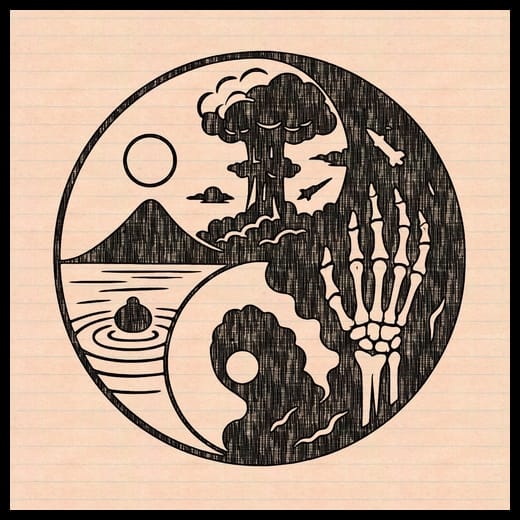
Children of tomorrow live in the tears that fall today
Will the sun rise up tomorrow bringing peace in any way?
There’s a lot packed into these two lines. They come from Children of the Grave, by Black Sabbath. The track itself pulses with urgency, warning, and a kind of longing. I was originally captivated by the pulsating drums but then I found the deeper meaning.
Beneath the heavy riffs and apocalyptic tones lies a message. A message that resonates fifty or so years after the track was written. What we do today echoes forward. The suffering we inflict, the fear we spread, the apathy we fall into. Everything is interconnected. Our actions or inactions shape the world our children inherit.
What a world to watch
In the UK, we’re witnessing something curious. A noticeable disengagement from the news. Traditional outlets are being tuned out, particularly by younger generations. Instead of relying on mainstream media, people are turning to social platforms, where information flows freely but often without context, clarity, or care. Maybe it’s burnout. Maybe it’s mistrust. Maybe it’s just too much.
But what happens when we look at the world and only see chaos. That everything is going to pot, over and over. Or worse, we see nothing at all? When we’re overwhelmed or numb, it’s easy to retreat, to disconnect. But Zen offers a different kind of response. One that doesn’t ask us to respond with charged emotions, but simply to see. To accept, and go about our days, gracefully. Improving what we can.
Zen speaks of suchness. The world as it is, before we name it good or bad. The warfare, the silence, the tears, the sun. None of it holds inherent meaning. Everything arises, changes, and fades. It is our minds that judge, cling, fear, and crave. And from that clinging, suffering blooms. The Buddhist tradition is clear: attachment is the root of all suffering. Not because life is cruel, but because we resist its natural flow.
Float over fight?
Zen teacher Henry Shukman tells a story of someone flailing in deep water. The more they struggle, the more they sink. But the moment they let go, something unexpected happens. They float. The very water they feared becomes their support. He uses this metaphor to explain this as original love. The quiet but constant support of the universe itself. The idea that we are held, simply because we exist. It seems overly sentimental, but it’s not a promise of safety. It is just the nature of things.
And yet, even this acceptance requires courage. Not the kind that fights, but the kind that shows up. That chooses love in a world besieged by fear. That dares to believe in connection over collapse. You have to be proactive to love. Love is an action, and loving is done in action. This takes courage. Black Sabbath, in their own way, were calling for the same kind of courage with this warning:
Show the world that love is still alive, you must be brave
Or you children of today are children of the grave, yeah
Choose to love
To choose love isn’t passive. It’s defiant. It is a revolution of attention. Of presence. Of refusing to turn away. And maybe that’s how peace begins. Not in the horrific headlines, but in the silent acts of getting on with life despite them.